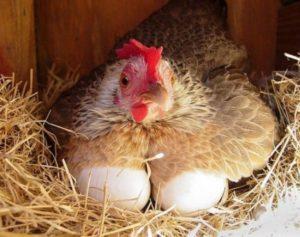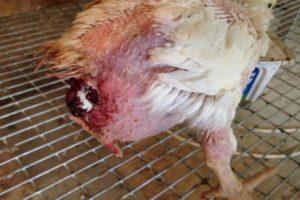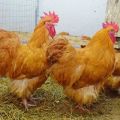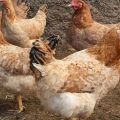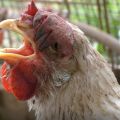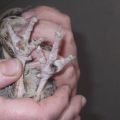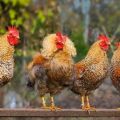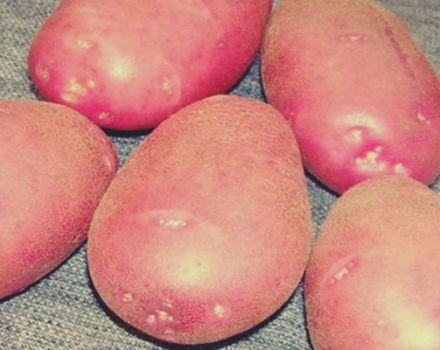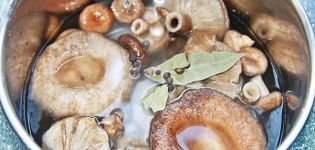What to do and how to treat diarrhea in laying hens at home with drugs and folk remedies
How to treat diarrhea in laying hens - a novice poultry farmer may not know the answer to this question. But it is important to understand what counts as diarrhea, because loose stools are not a cause for concern. If the bird is lethargic, drinks a lot, refuses food and behaves strangely, then you should think about how to treat it. If a person does not understand and first encountered such a problem, then he should assess the general condition of the chicken and plant it as soon as possible, otherwise the entire chicken coop may die.
Possible causes of diarrhea
Birds often die in large numbers due to infection with the virus, but there are other factors that can lead to similar problems.
Hypothermia
When a hen sleeps on a wet bed, it is cold in the hen house, then her body is in a stressful situation. This weakens the immune system, leads to the development of viral and infectious diseases. For this reason, poultry farmers are advised to regularly "renew" the top layer of the litter, and maintain the optimum temperature in the chicken coop.
Diet disorders
Or, in simple terms, vitamin deficiency. In this case, it is worth adding top dressing, “add vitamins”. Such a decision will be correct, especially if the problem with the stool occurred in the off-season, and the bird does not have obvious symptoms of the virus.

Intestinal infection
The ingestion of pathogenic bacteria and their active reproduction is dangerous. Antibiotics will help to correct the situation, to save the bird's life.
The main signs of intestinal infection are considered:
- Copious clots of mucus or blood in the droppings.
- Refusal to eat, lethargy.
Such a hen should be isolated, because infectious diseases spread quickly.
Virus in the body
It is believed that a viral disease cannot be cured, but this statement can be disputed. A bird suspected of having a virus is isolated from the chicken coop, if necessary, they give it antibiotics, change the litter, monitor the purity of the water, and regularly add food.
Poisoning
Being on a free range, a chicken can eat "something wrong": buttercup, spurge, celandine. These herbs can lead to poisoning. Also, the bird is often "poisoned" with metal, such poisoning is caused by improper storage of feed, the use of dishes made of aluminum and zinc for this purpose.

Power change
In this case, the situation is not dangerous, since it is temporary.As soon as the poultry gets used to the new food, the stool will return to the same consistency.
Dirty water
If the water in the drinking bowl is stale, then it creates a favorable environment for the reproduction of pathogenic flora, which increases the chances of poisoning.
Regular replacement of water in the drinker will help to avoid such problems, the liquid should be fresh and readable.
Infection with parasites
Helminths are another reason for stool changes; parasite eggs can be found in water and soil. To avoid infection, do not forget about prevention. Do it regularly by giving hens specialized medications.
Moving
It is believed that chickens have a hard time transporting. Change of place of residence and habitual diet leads to the development of diarrhea. But the situation stabilizes on its own as soon as the bird adapts to living conditions.

Low-grade feed
Also lead to vitamin deficiency, weaken the body. But it is worth replacing the feed, revising the diet, and the problem will be solved by itself.
Infectious diseases
There are a number of diseases that lead to the development of similar symptoms:
- Pasteurellosis - the causative agent is the pasteurella bacteria, resistant to environmental factors. The pathogenic microorganism affects both wild and poultry. It remains for a long time in corpses, manure, water. The disease proceeds in both acute and chronic forms, and is popularly referred to as "bird cholera".
- Pullorosis or typhoid - appears when pathogens enter the chicken's digestive system. In this case, the sick bird produces eggs, from which infected chickens hatch. If typhoid becomes chronic, then the chicken can be sick with it throughout its life.
- Salmonellosis is a well-known bacterial disease with specific symptoms that a person can become infected with. In sick chickens, the eyelids swell and stick together, and the joints become weak. Laying hens fall on their backs and jerk their paws. Infection occurs through water, as well as by airborne droplets, from sick individuals. Salmonella easily penetrates the shell of eggs, and can kill adult birds and young animals.
- Coccidiosis - the disease is caused by parasites and is more common in young animals than in adults. Infection with parasites occurs when a healthy bird comes into contact with a sick or recently ill one. Since after curing for another 7-8 months, chickens are considered carriers of parasites.

Attention! Colibacillosis and mycoplasmosis can be accompanied by similar symptoms and proceed with indigestion, disruption of the gastrointestinal tract. Do not forget about bird flu, one of the signs of which is diarrhea.
Symptoms of diarrhea in chickens
Pay attention to the following changes, indicating that not everything is in order in the chicken's body:
- In winter or summer, the bird is lethargic, weak.
- Refuses food, she has a poor appetite.
- Disturbed by strong thirst, the chicken drinks a lot.
- The consistency of the stool changes, streaks of blood, mucus, and a fetid odor appear.
- The body temperature is increased.
Green diarrhea
If the litter has acquired a similar shade, it should be regarded as a sign of several diseases:
- With Newcastle disease, a putrid odor appears in the droppings, coordination of movements is impaired, and mucus flows from the beak. With a prolonged course, paralysis develops, breathing difficulties arise.
- Pasteurellosis - the scallop wilts or changes color, becomes bright red, blindness develops in chickens. The disease proceeds against the background of an increase in body temperature. The stool of chickens is liquid, with a characteristic gray-green tinge.
- If the droppings resemble green jelly, or if there are other signs of infection, then it could be typhoid.
- Trichomoniasis - the disease is accompanied by diarrhea with a strong smell of rot.
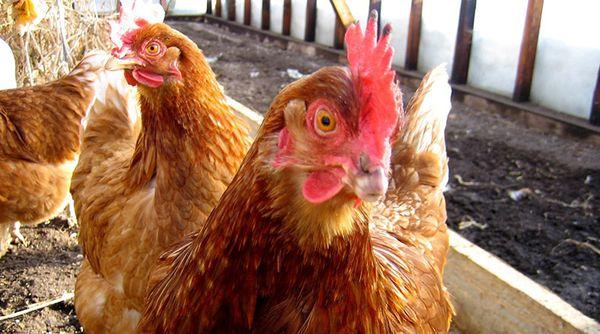
White diarrhea
In chicken, it is observed in two cases:
- When infected with salmonella. At the initial stage, the laying hen sleeps a lot, wheezing is heard in a dream when breathing, refuses to eat.
- Pullorosis - transmitted from wild birds and rodents, with the development of the disease, the cloaca is clogged with white discharge.
Yellow, brown, brown diarrhea
He says that the bird is not all right with the liver. One should beware of worms that can penetrate this organ.
And also yellow or brown diarrhea is regarded as a symptom of Gumboro disease, when the infection of adults occurs from chickens. At the same time, the following symptoms are worried:
- the chicken is trembling, its feathers are disheveled;
- she refuses food.
Feces with blood
Infection with coccidiosis is accompanied by the appearance of diarrhea with blood. This may be the result of eating poor quality feed. Most often, birds get sick before the age of 2 months, not older. The disease bothers in the autumn or spring. The color of the comb changes in the chicken, it brightens, the bird is lethargic, apathetic.
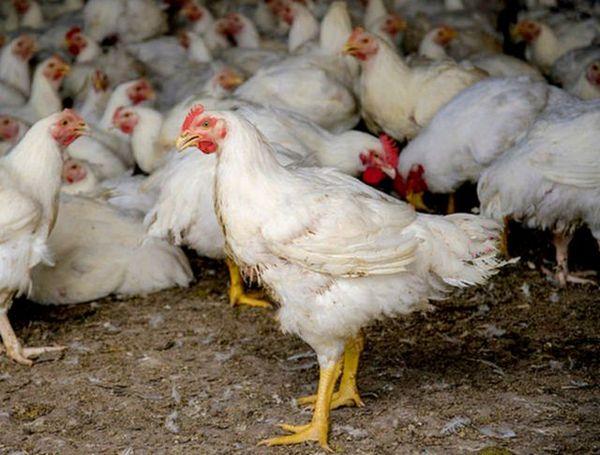
How to recognize diarrhea
In laying hens, the chair has its own characteristics:
- If gas bubbles appear, the smell of droppings has changed, then you should think about the causes of the problem.
- When the bird became lethargic, apathetic, its behavior changed - this should be regarded as a symptom of infection.
- If you notice an admixture of mucus, blood, blotches in the droppings, then isolate the chicken, it is highly likely that it is sick.
Normal litter is of two types:
| Intestinal | These are formed granules, brown in color, accompanied by blotches of uric acid, they are white. If the shape of the droppings is uneven, its consistency has changed, and an unpleasant odor appears, then it's time to think about the presence of malfunctions in the work of the body of poultry. |
| Cecal | This litter is also called "night", it has a liquid consistency, as it is formed in the lumen of the rectum. Observed once a day. If the consistency of the droppings has changed, then this should be regarded as an alarming sign. |
Disease treatment methods
At home, curing a bird is not so easy, since laboratory tests are often required to make an accurate diagnosis.
Antibiotics
The dosage is determined by the veterinarian, since only the doctor can find the right drug. Preference is given to means in the form of drops - they are mixed into water and given to chickens.
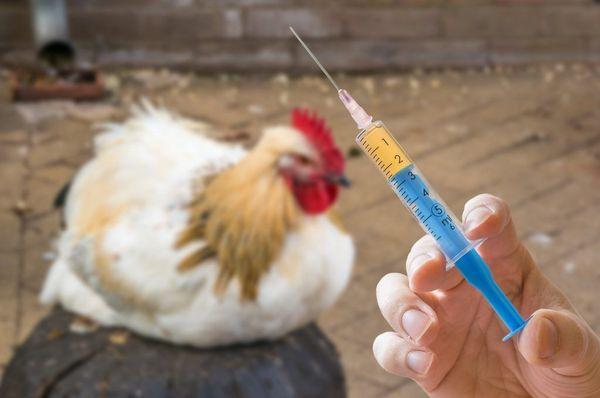
If it is not possible to consult a doctor, then universal remedies are preferred. When there is no veterinary pharmacy nearby, you can give the bird a human antibiotic, for example, Levomycetin or Biseptol.
Note: antibacterial therapy is effective in case of infection with pathogenic bacteria; in relation to viruses, it will not bring the desired result.
Probiotics
Flosan, Emprobio - suitable for birds, they are given, strictly following the instructions. You can supplement the diet with curdled milk, it will help restore the microflora after antibiotic therapy.
Vitamins
Best given after complete recovery. Taking antibiotics weakens the body, the following supplements will help restore it:
- Undevit is a universal drug that accelerates metabolic processes in the body of birds.
- Biovit is a complex feed additive that will help the laying hen recover from illness and infection.
- Trivit - acts as a prophylactic agent, helps in the fight against vitamin deficiency.
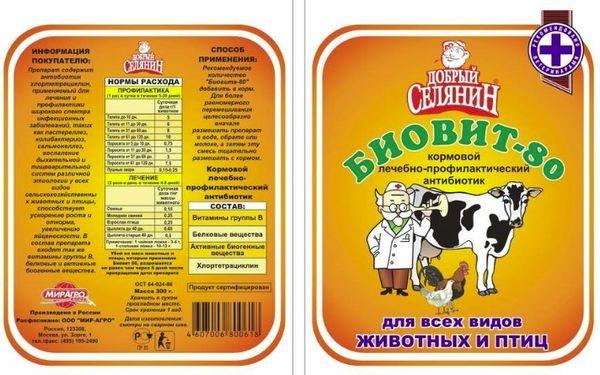
Folk remedies
If the bird is poisoned, then the following should be done:
- Add activated carbon, potassium permanganate crystal to the drinker.
- A decoction of rice and oats will help, it is given to layers, since it has an astringent effect. And at the same time it will not allow the bird to weaken, lose strength.
- Chickens can also be given a decoction of oak bark, chopped walnut partitions.
Disease prevention
Is as follows:
- it is worth keeping the bird clean, regularly changing the litter;
- monitor the quality of feed, change the water every day;
- when buying new chickens, keep them separately for 2 weeks, during this time infections, if any, will appear;
- regularly carry out antiparasitic treatments, give vitamins to layers;
- eliminate the likelihood of rodents getting into the chicken coop, avoid contact of poultry with wild.
Diarrhea for chickens is dangerous due to dehydration, the bird weakens, loses interest in food. This is regarded as a reason for her isolation. To find out the reason for the change in the state of the layers, they are evicted, shown to the doctor, and treated. This allows the poultry farmer to save the chicken coop and avoid massive loss of livestock.
